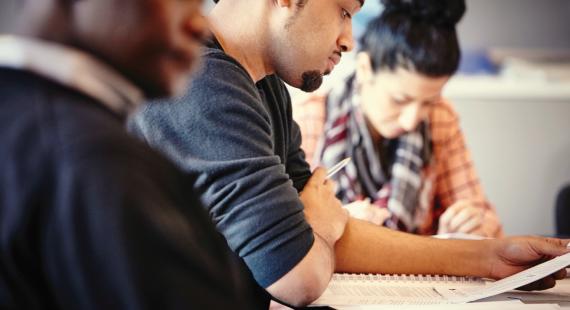Attending lectures, asking questions and taking notes are all important parts of going to university. But knowing how and when to study can be the key to your success. Studying effectively will improve your grades and ensures you can still enjoy the fun things in life.
However, studying isn’t always easy. There are many barriers that can get in the way of a good study session – a constantly buzzing phone, a noisy background, or a not-so-perfect study space. But never fear, we are here to help you address your study challenges so you can study happily and effectively.

Where to study
It’s crucial to find the right study environment for you. The ideal study space differs for everyone, meaning that there is no perfect place. Whether you prefer your bedroom desk, a quiet coffee shop or the Library, there are a few aspects that all great study spaces embody. This includes:
- a tidy space
- a strong Wi-Fi connection
- spare sockets
- a comfy chair
- lots of natural light
- plenty of refreshments on hand
You can find lots of study spaces both on and near campus. Find the best study zones on our Instagram Reel. We love the spaces in the Library and have a soft spot for the diverse Allerton Learning Space.
The study spaces mentioned above have different capacities, so keep this in mind when you’re planning both a solo and group study session. The Clifford Whitworth and Allerton Spaces can only be reserved for a maximum of two people, whereas The Cube (not the one with Phillip Schofield, the one in Lady Hale) can be booked for up to eight people.
Bonus tip: You can book a study space even faster through the Library app.

Time Management
The best way to study effectively and avoid those library all-nighters is to create a study routine. Studying is a marathon, not a sprint. There’s a lot of new information to learn, so it’s best to create a routine early and stick to it (as best you can) throughout the Trimester.
If you cram full-day sessions into the weeks leading up to an assessment, you’ll burn out and will struggle to retain what you’ve revised. Instead, block out shorter study sessions over the Trimester. This could be two-hour study slots at the same time each week, or you could select a particular day to focus on a subject. By doing this, you’ll have a structure for your study sessions and know when to put on and take off your study cap.
Managing studying and a job
If you work part-time, it can feel like you have less time to study. But if you organise your time correctly, you can still find the time you need to get ready for an exam or complete an assessment to a high standard.
If possible, ask for your shifts in advance, so you know where you can fit in study sessions along with your other responsibilities. You could also save some annual leave dates for the assessment period.
We strongly advise you only work a maximum of 20 hours otherwise it could impact your learning.

Keeping motivated
Our old friend (and foe) motivation. One of the driving factors behind effective study and something we all struggle finding from time to time. Besides planning your study routine, plan for after you’ve finished your assessments. This can be for fun activities like spending time with friends and family or going on a holiday. This will help you greatly in the hectic study periods, as you will know that once you’ve put in all the hard work, you have something to look forward to.
It’s important to accept that there might be times where your motivation dips. It’s completely normal and happens to most people. A great way of ensuring this doesn’t affect your work is to find balance between studying and your other priorities. To study effectively you need good energy and concentration levels. This comes from taking a break to do other activities.
Distractions and Responsibilities
You’ve got a space to study, have your study sessions planned and know how to keep motivated, so you’re ready to go right? Not quite. We all fall victim to dreaded distractions – scrolls through our Instagram feeds or a £30,000 cash-builder on The Chase. Distractions are a natural part of any study session as our brain can only concentrate for a limited amount of time.
An effective way of dealing with distractions is micro studying (not to be confused with microlearning). This is where you break your study sessions down into 15-minute chunks, followed by 10-minute breaks. If you do this regularly, you’d be surprised how much study time you complete and how much information you retain.
Before starting each study chunk, switch your phone onto airplane mode or leave it in another room to limit the chance of being distracted.

Reaching out for support
Don’t forget, if you are struggling there’s lots of support here for you. askUS is your one-stop shop for student support. They are here to offer guidance and advice, referring you to additional support when appropriate. You can speak to the askUS team on campus or you can reach them via email, phone or live chat.
We understand that if you live with a disability you might need additional support and/or adjustments to help you with your learning. The Disability & Learner Support team can create a Reasonable Adjustment Plan for you. This lets your academic team know about the barriers you experience and the adjustments that can support you. This could be extra time in exams or support with presentations.